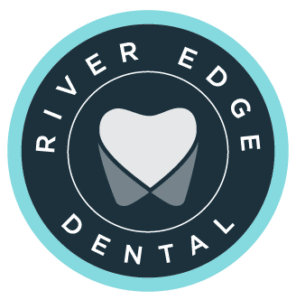Don’t let pain or missing teeth stop you from smiling. At River Edge Dental, we have the experience and skills to revive your oral health to the way it once was, giving you back your confidence while improving your overall health.
To learn more about dentures and TMJ, please call us at our office in River Edge, NJ for reconstructive dentistry today.
What Is TMJ?
TMJ is a very complicated condition that we have had a lot of difficulty pinning down, and we have determined that it’s really a number of related conditions that have overlapping causes and create similar symptoms. As a shorthand, we often describe it as an imbalance in the jaw system, but there are many potential forms that imbalance could take.
One of the earliest and most common types of TMJ is a simple muscle imbalance. When your muscles are trying to find a restful position but they can’t either because of the configuration of your teeth, the state of the jaw, or even conflicts with any of the other muscles that have to work with each other to control the jaw.
Another type occurs when the cushioning discs inside the temporomandibular joints become displaced. When this occurs, the jaw may not open and close smoothly — there may be irregular motions and you may experience popping and clicking. The jaw may even stick so that you can’t open or close it, or may have very limited movement.
Finally, TMJ can be related to pinched or pressured nerves in the jaw or face. There are many nerves that go through or past the jaw. They often intertwine with jaw muscles and thread into the bones of the temporomandibular joint. Pressure on these nerves can cause many types of pain and even related symptoms like tingling or numbness.
It would be wrong to limit our understanding of TMJ to just one type or cause — it’s impossible to understand all symptoms without allowing for these types as well as subtle gradations and combinations.
TMJ Symptoms
It can be a difficult condition to diagnose and treat because of the number of disparate symptoms it can cause. Common symptoms include:
- Jaw pain
- Jaw popping or clicking
- Face pain
- Headaches
- Neck, shoulder, or back pain
- Tinnitus, vertigo, and other ear symptoms
- Damaged or worn teeth
- Tingling and numbness in the hands and fingers
As well as many other symptoms. The particular mix of symptoms experienced by any TMJ sufferer often indicates the specific type or types, but other times it’s hard to figure out how the symptoms are connected. You may not even be aware of how many symptoms are caused by your TMJ until they resolve with treatment.
Sometimes, you may experience secondary symptoms, too: conditions indirectly related to TMJ. Many people develop depression, and many also have sleep apnea. Indirect symptoms may resolve when it is treated or they may require separate treatment.
TMJ Treatment
The first step in TMJ treatment is usually TENS (Transcutaneous Electrical Nerve Stimulation), something like an electrical massage. TENS is a great first step in TMJ treatment because it relaxes your muscles and stimulates the release of endorphins, your body’s natural pain relievers. It also serves to wipe the slate clean of all your body’s acquired habits. These habits can be caused by malocclusion, stress, jaw trauma, and many other factors, but they keep your jaw from finding its natural rest position.
Once we’ve relaxed your muscles, we can do our diagnosis and recommend the proper treatment for you. In some cases, you may just need regular TENS to keep your muscles from falling into bad habits again. Other times, we may recommend a bite splint. This helps hold your jaw in a restful position to prevent the return of TMJ symptoms. If your bite splint works well, but you don’t like the appliance, we can sometimes build up your teeth to hold your jaw in that position without the appliance.
Rarely, diagnosis may reveal jaw joint problems beyond our ability to treat, and we may recommend surgery. Getting treatment sooner can help avoid this necessity.
If you would like to learn whether your symptoms are TMJ and learn more about treatment options, please contact our office in River Edge, NJ to make an appointment.
Dentures
If you have lost one or more teeth, dentures are a simple, economical approach to replace them. They are among the oldest dental technologies, which means that we know very well what to expect from them. Despite their age, modern dentures have gone through a number of technological improvements, making them much better than those your parents or grandparents wore.
Partial Dentures
Partial dentures are used when you’ve lost some teeth in an arch, but not all the teeth in that arch. The typical partial denture consists of one or more false teeth attached to a plastic base that uses metal clasps and hooks to secure itself to your natural teeth for support.
Partials can be used in either the upper or lower arch, and we can often add additional teeth to the same denture if you lose additional teeth.
Full Dentures
Full dentures are used when you have lost all the teeth in either your upper arch or lower arch. These include false teeth set in a base that looks like your natural gums. The teeth can be made of the same plastic as the base or they can be made of ceramic material to make them look more natural.
Implant Dentures
Dental implants allow us to secure your dentures. They can either be removable and retained or supported by dental implants. Either way, they will now stay in place and can have a much higher chewing efficiency than in the past.
Implant dentures can be made using many different approaches. If your main concern is that they stay in, we can secure them with as few as two dental implants. We may even be able to adapt your current dentures. This is an inexpensive and relatively quick fix for your implant dentures. If you want greater strength in your bite, we can employ more implants to give you a bite that is about as strong as your natural teeth. This requires more implants and usually means you will need new dentures designed to sustain the bite force.
We will talk to you about your implant denture options so you can find the best ones for you.
Upgrading Your Dentures
New You Dentures use advancements in our understanding of your bite to ensure the best possible fit. They fit so well, in fact, that they don’t just fit your mouth, they fit your entire face. When you lose teeth, you lose the bone that supported those teeth. At best, traditional dentures only try to replace those teeth. But New You Dentures are designed to replace both the teeth and the bones. As a result, the wrinkling and sunken faces that we associate with traditional dentures are reduced or eliminated. Your face is restored.
New You Dentures are designed using neuromuscular dentistry principles to ensure they reproduce your natural bite. This leads to improved comfort and improved function. We even verify the balance of your new bite using T-Scan digital bite measurement, which measures the forces all along your dentures in real time to ensure there are no painful pressure points.
New You Dentures also utilize the most modern materials available. The teeth are made of advanced ceramics, similar to the ceramics used for porcelain veneers, all-ceramic dental crowns, and other cosmetic restorations.
New You Dentures also make great implant dentures. The neuromuscular fitting technique helps ensure that they don’t suffer from excessive bite force, and the quality materials mean that they can provide natural, effective chewing.
If you are looking to replace missing teeth, please call us at River Edge, NJ to schedule your appointment today.



